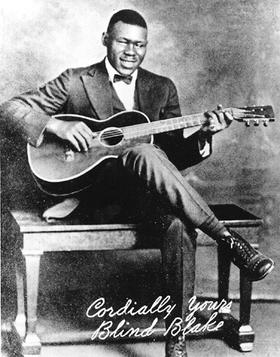Blind Blake, born Arthur Blake, is widely regarded as one of the greatest and most influential guitarists of the early 20th century. A pioneer of the Piedmont blues style, he captivated audiences with his intricate fingerpicking technique and lyrical storytelling, leaving an indelible mark on the history of blues music. Despite his extraordinary talent, much of Blind Blake’s life remains shrouded in mystery, adding to the allure of his musical legacy.
Early Life
Blind Blake’s exact birthplace and date are subjects of speculation, but he is believed to have been born in the 1890s in Jacksonville, Florida, or possibly Newport News, Virginia. His blindness, which occurred either at birth or early in life, never hindered his musical aspirations. Instead, it seemed to amplify his dedication to the guitar, which became an extension of his voice and spirit.
Musical Career
Blind Blake’s recording career began in the mid-1920s when he signed with Paramount Records, a label known for its groundbreaking blues recordings. His first recorded track, “West Coast Blues,” showcased his mastery of ragtime-influenced guitar playing, a style that blended intricate syncopation with the emotive depth of the blues.
Throughout his career, Blind Blake recorded over 80 songs, including classics like “Diddy Wah Diddy,” “Police Dog Blues,” and “Southern Rag.” His lyrics often depicted the trials and triumphs of everyday life, offering a window into the cultural and social landscape of his time. His virtuosic playing, characterized by its fluidity and precision, earned him the nickname “King of Ragtime Guitar.”
Legacy
Blind Blake’s influence on blues and fingerstyle guitar cannot be overstated. His recordings became a touchstone for subsequent generations of musicians, inspiring legendary artists such as Reverend Gary Davis, Brownie McGhee, and Ry Cooder. His ability to seamlessly blend technical skill with emotional expression set a standard for blues guitarists and remains a benchmark for aspiring musicians today.
Mysterious Death
The circumstances surrounding Blind Blake’s death are as enigmatic as his life. He disappeared from the public eye in the early 1930s, and little is known about his final years. It is widely believed that he passed away in Milwaukee, Wisconsin, in 1934, though the exact details remain unclear.
Rediscovery and Continued Appreciation
Blind Blake’s music experienced a resurgence in the mid-20th century, as blues enthusiasts and folklorists sought to preserve the genre’s rich history. His recordings have since been reissued on numerous compilations, introducing new audiences to his genius. Today, Blind Blake’s work continues to resonate with listeners, cementing his place as a cornerstone of American music history.
Conclusion
Though much about Blind Blake’s life remains a mystery, his contributions to the world of music are undeniable. As a trailblazer in the Piedmont blues tradition, his innovative guitar work and soulful songs continue to inspire and captivate audiences nearly a century after his recordings were first made. Blind Blake’s legacy is a testament to the enduring power of blues music and the timeless appeal of its pioneers.


No responses yet